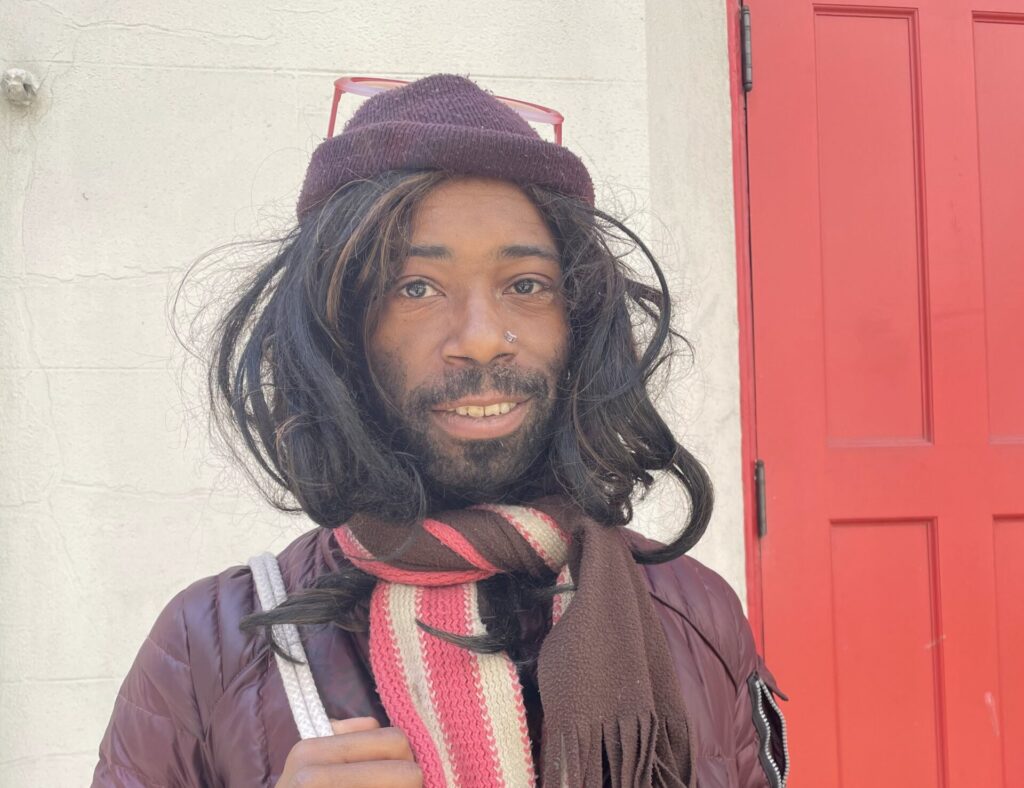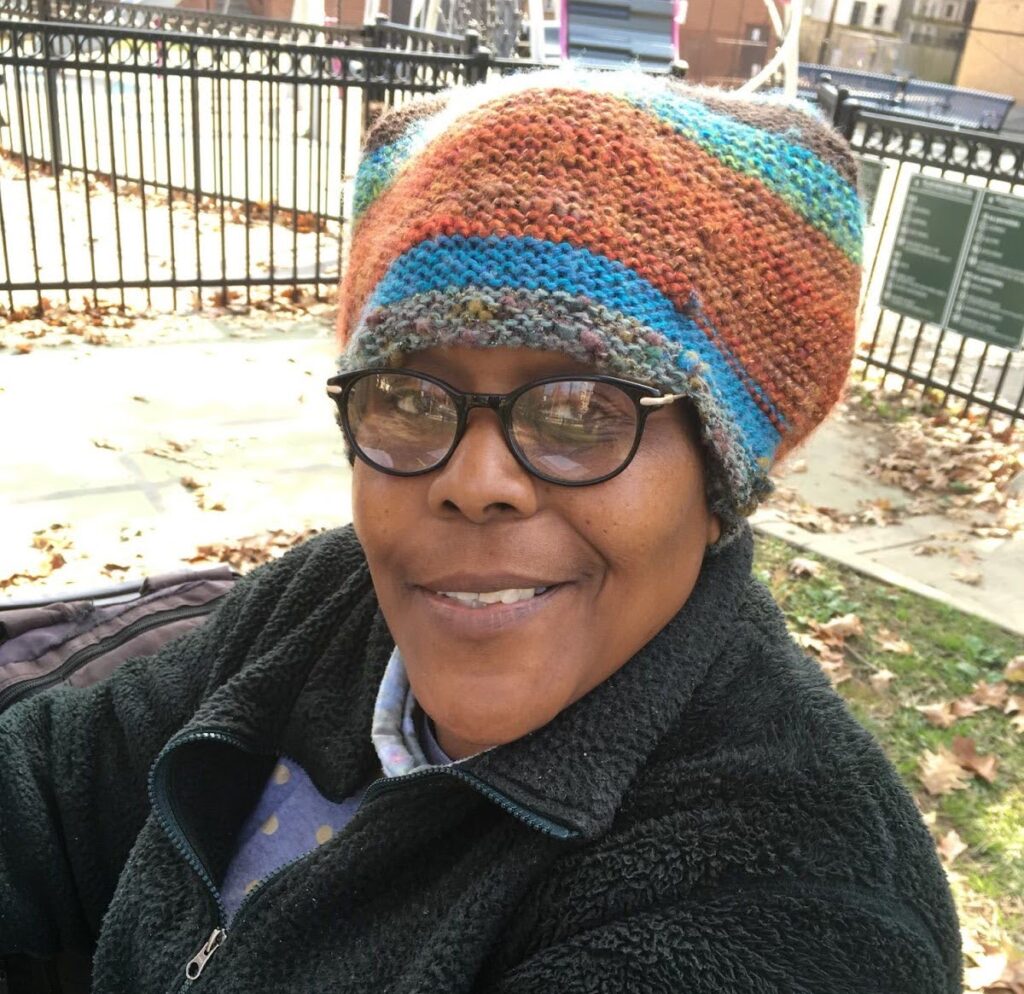The glossy wrapper of a white Kit Kat is layered over a colored pencil drawing of the titular candy bar. An anthropomorphic cat in a bra leans one of her front paws against the supersized chocolate, staring out beneath thick black lashes. A giant milk bottles loom behind her, setting the scene for the thought bubble that floats above her head—”So he’s a two percenter?”
This is a panel from Akindele Akerejah’s series, the #WhiteKitKatSyndicate. “Iconoclastic” in his own words, it blends together pop culture references, product placement, homages to organized crime and elements of collage to explore themes of animal welfare and identity politics.
Street Sense has been releasing panels from this 100 page series since 2022. Although Akerejah’s art often graces the weekly paper, the solitary artist is harder to nail down. In the over 10 years since he first started with Street Sense, he’s started his own art studio for like-minded individuals, crafted collage-based graphic novels and dipped his toes into fashion. And the 38-year-old artist is just getting started.
This conversation has been edited for length and clarity.
Who is Akindele?
Right now I’m a man who — I’m learning to live independently in the absence of a nuclear family. No, I won’t say absence, but I’ll just say that I’m filling my life with fulfilling work items and points of achievement. I like to believe that Akindele that you look for, everything you need about him is in writing, and then [you can] find whatever you need [about him] in interpersonal conversation. I also say that Akindele is usually sharper than he gives off, and that’s an unusual disclosure. But additionally to that I’m also the founder of the Dopamine Clinic. It’s an 11-year -old studio, and almost 12 years old.
What are some of the influences in your art?
Something more of a folksy theme. You know, when things are folksy— like for instance, I didn’t want to run into this type of Senator Alan Keyes problem, or the Carlton Banks problem of “I am anti-Black through some type of propriety” or a Nas song that talks about avoiding oxtail to be seen eating foie gras or something else I haven’t tried. And I feel like by associating my roots, at least I’m giving maternal credit to my upbringing, since my mother’s family is American.
I think that it also helps balance me out with some of the overachievement items that I am not alone in having experienced failure in as a first generation. Any Nigerian father whose son is not a lawyer, or some type of administrator, is really disappointed. So that’s why I got the news that my father died through email. Because at this point in time, I’m already solid enough a person to not need to be anybody’s son. Like defining myself as, “Well that’s my father,” it just seems very BBC Game of Thrones. I think it’s more of an all-American thing to say, “Who are you? Who am I?” Because I’m not trying to get anybody’s hand claps other than mine at the end of the day.
Is that a recent attitude for you, of focusing on yourself and your own achievement?
It’s kind of always been like that, but I thought more arrogantly before in the sense that I thought that giving everybody around me the opportunity to be part of the greatness that I wanted to build was going to be the best way for them to cut themselves off at whatever point they decided to in the end. Because I’m not sure if you read about my background in hustling, cocaine importing and drug dealing downtown and everything like that — those are cutthroat enterprises, experiences. And if you’re not the smartest person out there, then you’re also the toughest person out there. And I think this is witnessed by the fact that I’ve sent practical jokes to the FBI. And essentially, I’m the only person of my caliber in organized crime who has no felonies, or felony charges or anything.
You’ve spoken extensively about your background in crime. How has that informed your art?
It’s informed my art because I’m one of the only people, aside from maybe Jay Z that I can think of, that has the authorizations historically, to submit work of that nature and have automatic authenticity.
Do you feel like you’d be able to portray the story of the #WhiteKitKatSyndicate as authentically if you hadn’t had those experiences?
Probably not. I mean, the thing about authenticity is the era that I come from as a listener to hip-hop music, before trying to make I guess what would have been called a fanzine mixtape. There was a family on 19 Hughes Road called the Ngangmutas. And I made this mixtape about, you know, “I’m shooting my gun and I’m getting money” and you know, the rap city era. And they were like, this is inauthentic. And so I think that they are the foreauthors of my crime resume pursuits.
What does your artistic process look like?
The technique is to use a mechanical pencil first. And after that is to use a pen, a Bic pen preferably, like somebody like Francis Akerejah, in Nigeria, or London, wherever he is, started me off with, and then the colored pencils, and whatever medium and sort of bits like in graffiti come up out of that. And it’s definitely about the bordering. Creating the border gives it a letterbox feel and the signature gives sort of a fine art motif.
So you’ve really moved away from collage, this art form that you were originally known for. How did that process happen?
I just felt as though I was in a position that I wasn’t able to justify to myself being the type of artist that my promotion machine was developing. And somebody I think, Mr. Goobie, and David Snebold from the University of Pennsylvania, he said, “You’ve got to draw, dude.” And that was pretty much where things got started.
And I mean, just drawing was really important. Knowing how to draw and not needing somebody to draw things for me was just so important because once people — like even the original members of my studio and associates, they stepped off by themselves when they realized this is no longer a “cut things up and glue” thing, you have to bring skills and be prepared to be serious.
Tell me a little bit about the imagery of the #WhiteKitKatSyndicate.
You just end up seeing the sort of Italian Mafia from the 1950s theme, or really more Mario Puzo sort of homages in my visuals. So what you’re seeing in the #WhiteKitKatSyndicate, it has the air of organized crime. But really, all you’re seeing is a bunch of guys in suits, passing around specialty cakes, and you know, there are some women eating. They’re like professionals who get caught eating in certain neighborhoods because of that reputation for a fish fry or just the speakeasy atmosphere. So I think that I’m using stereotypes and distinctions on my own terms. And that’s what makes it collage in a sense.
What’s the impact you want the #WhiteKitKatSyndicate to have?
It is completely filled with a loaded meaning. Because I’m also doing a study of, “How comfortable are European Americans or white people promoting something that has nothing to do with their actual identities?”
I’m making it something where it’s like, a question of, you know, “Should I be ashamed of being white? Should I be defending being white?” And that’s the question that I can’t answer.
Who are you going to become?
A fashionista, funny enough. I think I’ve cultivated enough independence from groups of friends now to dress the way that I want creatively.
I think that I’m leaving it limited to T-shirts, and then having certain people having these things handmade to go beyond a product line that includes tote bags, and for limited people. What I mean by that is, I don’t want 400 million people buying them. I want to still have that feeling of that club membership.
What’s next for your art?
I think that I’m getting to that Radiohead third album type of area where it’s like, you know, I don’t want to do this rock music exactly like a formula thing. I want to do something experimentally. #TheSummersetDessertShoppe, is what I’ve come up with to try and like, you know, take my time with.








